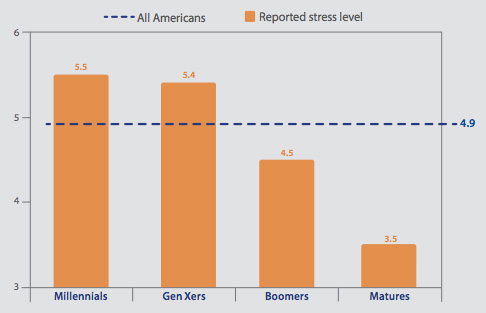
Are you sleepless and stressed? Are anxious thoughts keeping you up at night and tense during the day? According to a study by the American Psychological Association those of us living in the Kirkland – Seattle area are slightly better at managing our stress levels than other Americans, but we still have difficulty achieving stress management goals.
Millennials and Gen Xers Most Stressed
In a survey involving over 3000 people, those in the millennial generation or people born between the early 1980s to early 2000s were most affected by stress, followed closely by Generation X, born between early 1960s to early 1980s. These younger generations reported an average stress level of 5.5 and 5.4, compared to 4.5 for Baby Boomers and 3.5 for older people.

What keeps us stressed:
Considering how much time and energy many of us spend pursuing our careers, it’s not surprising that work is a major source of stress. Living in Kirkland, Bellevue, Seattle, or Redmond means that you’re probably working long hours, beyond the usual Monday to Friday, 9-to-5. At a large company, production cycles and political maneuverings can be tough challenges. If you’re working for a small business, you may be taking on many different responsibilities and pressured to do more with less. Miscommunication between co-workers is common, sometimes leading to misunderstanding and frustration. The result is that even when we’re not at work, many of us are thinking about work. This can lead to feeling stressed.
10 common symptoms of stress
- Headaches
- Insomnia
- Upset stomach, including diarrhea, constipation, and nausea
- Aches, pains, tense muscles
- Skin problems, including acne and eczema
- Becoming easily agitated, frustrated and moody
- Feeling overwhelmed
- Having low self-esteem and feeling bad about yourself
- Avoiding others, isolating yourself
- Overeating
What you can do to de-stress
If you’re experiencing two or more of these symptoms, take the time to unwind and heal yourself. Take a walk, do yoga, eat healthy meals, meditate, and reach out for help. Oftentimes, a moment to reflect will help calm your nerves and renew your energy. Consider talking to a professional counselor. Some people may be hesitant to seek therapy, and rely on their friends to air their problems. Talking to friends is great, and we encourage it. However, bear in mind that therapists are objective professionals with a lot of experience in helping people sort out their deep-seated issues.
Psychological patterns based in fear, anger, resentment, and sorrow are harmful to our well-being at every level, and changing these patterns on our own can be challenging. A highly experienced therapist can help you sort out the complicated issues and make the changes you want. Our in-house therapist, Robert Hirsch puts it this way:
“You’re on the top of a mountain, pointing your skis down, and if you shift your skis even slightly you’ll end up in a very different place at the bottom of the mountain. Everyone needs help, life is a difficult school. Mental health counseling from a holistic approach can help you align your skis, so to speak, to have your life move in the direction your heart wants.”